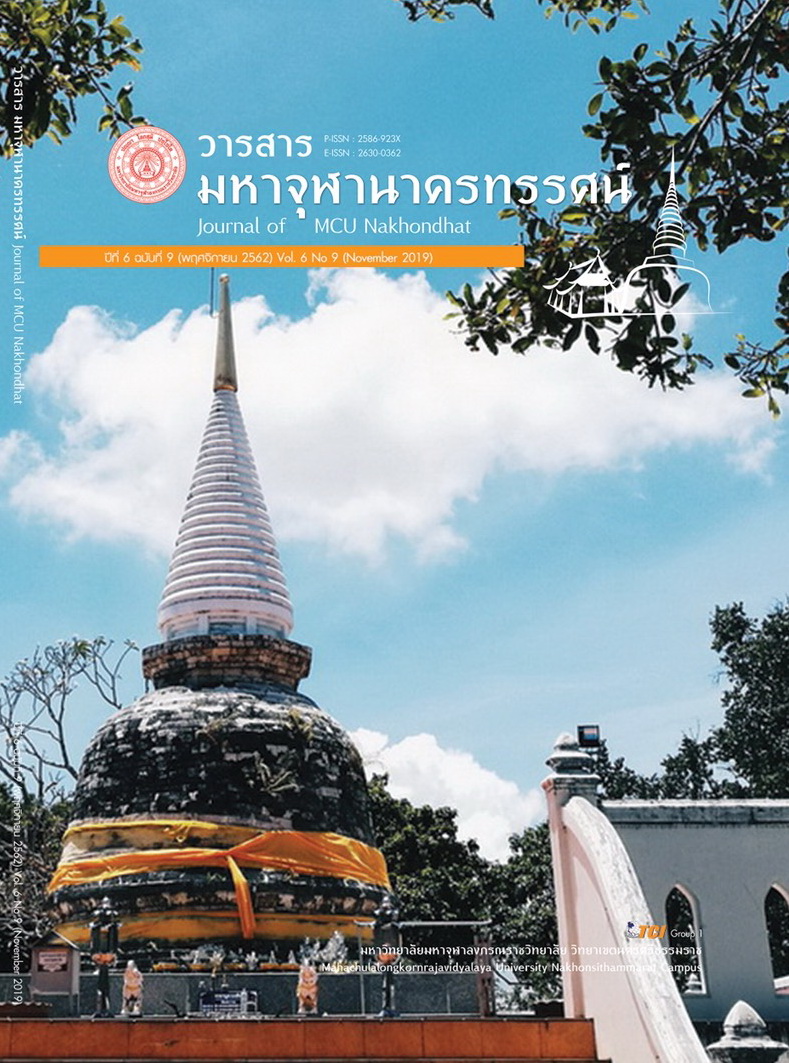STUDENTS' SATISFACTION ON LEARNING MANAGEMENT USING COMMUNITY LEARNING RESOURCES IN THE MULTICULTURAL AND LOCAL WISDOM COURSE
Main Article Content
Abstract
The objectives of this study were: 1) to investigate the students' satisfaction on learning management using community learning resources in the Multicultural and Local Wisdom course, 2) to compare students’ satisfaction on learning management using community learning resources in the Multicultural and Local Wisdom course by gender and age, and 3) to study students’ opinions about learning management by using community learning resources in the Multicultural and Local Wisdom course. The sample group consisted of 150 first year bachelor of nursing students at Boromarajonani College of Nursing, Nakhonratchasima, who enrolled in the Multicultural and Local Wisdom course in the academic year 2018. The samples were selected using the simple random sampling method. Data were collected from questionnaires and analyzed by descriptive statistics, t-test and content analysis.
The research results found that:
Students were satisfied with learning management by using community learning resources in Multicultural and Local Wisdom course at the highest level. All aspects were at the highest level, where the Instructor had the highest mean score, followed by Measurement and evaluation, and Instructional activities, respectively. When considering each item, it was found that the highest mean score was that the students chose the learning resources to study according to their interests, followed by teachers giving students freedom of thinking and making decisions, and students learned about the topics that were relevant to the needs, together with the teachers facilitating and taking care of the students, respectively
The students with different gender and age were not statistically different in their satisfaction on the overall learning management and each aspect
For the opinions, the study found that most students perceived that learning by using community learning resources enabled them of learning to work together in a group, having responsibility, learning culture and local wisdom from the actual sites, having hands-on learning experiences, gaining direct experiences, having thorough knowledge, seeing the value of local wisdom, being proud and continuing to preserve local wisdom, as well as developing of communication and presentation skills, and having fun and happy learning.
Article Details
References
คณะอนุกรรมการการจัดการความรู้ด้านการเรียนการสอน มหาวิทยาลัยศรีปทุม. (2555). คู่มือแนวปฏิบัติที่ดีการจัดการการเรียนการสอนโดยเน้นผู้เรียนเป็นสำคัญ. กรุงเทพมหานคร: มหาวิทยาลัยศรีปทุม.
จารุวรรณ เทวกุล. (2555). ความพึงพอใจของนักเรียนระดับประกาศนียบัตรวิชาชีพ ประเภทวิชาพาณิชยกรรม ชั้นปีที่ 1 ชั้นปีที่ 2 และชั้นปีที่ 3 วิทยาลัยอาชีวศึกษาฉะเชิงเทรา. ใน วิทยานิพนธ์ปริญญาการศึกษามหาบัณฑิต สาขาวิชาธุรกิจศึกษา. มหาวิทยาลัยศรีนครินทรวิโรฒ.
ณิรดา เวชญาลักษณ์. (2559). การพัฒนาผู้เรียนโดยใช้โครงการศึกษาแหล่งเรียนรู้. วารสารบัณฑิตศึกษา, 13 (63), 1-10.
ทิศนา แขมมณี. (2557). ศาสตร์การสอน: องค์ความรู้เพื่อการจัดกระบวนการเรียนรู้ที่มีประสิทธิภาพ. (พิมพ์ครั้งที่ 17). กรุงเทพมหานคร: จุฬาลงกรณ์มหาวิทยาลัย.
บุญชม ศรีสะอาด. (2560). การวิจัยเบื้องต้น. (พิมพ์ครั้งที่ 10). กรุงเทพมหานคร: สุวีริยาสาส์น.
สมชาย บุญสุ่น. (2554). ความพึงพอใจของนิสิตที่มีต่อการเรียนการสอนของมหาวิทยาลัยมหาจุฬาลงกรณราชวิทยาลัย จังหวัดพระนครศรีอยุธยา. ใน วิทยานิพนธ์พุทธศาสตรมหาบัณฑิต สาขาวิชาพระพุทธศาสนา. มหาจุฬาลงกรณราชวิทยาลัย.
สำนักงานคณะกรรมการการศึกษาขั้นพื้นฐาน. (2555). การจัดการเรียนรู้ที่เน้นผู้เรียนเป็นสำคัญ: การจัดการเรียนรู้จากแหล่งเรียนรู้. กรุงเทพมหานคร: โรงพิมพ์คุรุสภา.
สำนักงานเลขาธิการสภาการศึกษา. (2560). การจัดการเรียนรู้จากแหล่งเรียนรู้. กรุงเทพมหานคร: โรงพิมพ์คุรุสภา.
สุวิทย์ มูลคำ และอรทัย มูลคำ. (2553). 20 วิธีการจัดการเรียนรู้: เพื่อพัฒนาคุณธรรม จริยธรรม ค่านิยม และการเรียนรู้โดยการแสวงหาความรู้ด้วยตนเอง. กรุงเทพมหานคร: ภาพพิมพ์.
อภิเดช ช่างชัย และคณะ. (2560). การพัฒนากิจกรรมการเรียนรู้ด้านการเกษตรโดยการมีส่วนร่วมของชุมชน: กรณีศึกษาโรงเรียนสาธิตแห่งมหาวิทยาลัยเกษตรศาสตร์ วิทยาเขตกำแพงแสน. Veridian E-Journal, 10(2), 1544-1560.
อรวรรณ บุราณรักษ์. (2559). การพัฒนารายวิชาภูมิปัญญาท้องถิ่นจากผลการเรียนรู้และการจัดการเรียนรู้โดยใช้ชุมชนเป็นฐาน. วารสารนานาชาติ มหาวิทยาลัยขอนแก่น สาขามนุษยศาสตร์และสังคมศาสตร์, 6(1), 32-49.
Butta, B. Z., & Rehmanb, K. U. (2010). A study examining the students satisfaction in higher education. Procedia Social and Behavioral Sciences, 2(2), 5446–5450.
Knowles, M. S. (1975). Self-directed learning: A guide for learners and teachers. New York: Cambridge Book.
Krejcie, R. V., & Morgan, D. W. (1970). Determination sample size for research activities. Educational and Psychological Measurement, 1(3), 607-610.
Rienties et al. (2013). Student experiences of self-reflection and peer assessment in providing authentic project-based learning to large class sizes . Netherlands: Springer.
Thorndike, E. L. (1927). The law of effect. The American Journal of Psychology, 39(1/4), 212-222.


